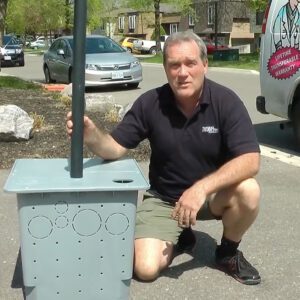No matter the age, size, style, or material composition of your home, it is important to know everything you can about the foundation. From a century-old Victorian home to a new build bungalow, every type of foundation can run into issues if it wasn’t built correctly or maintained right. We have compiled this list of common foundation types and what can go wrong.
Block Foundation
Block foundations are built to be strong and durable. If the retaining walls aren’t properly sealed and strengthened with rebar, water can seep through the blocks. Additionally, block foundations may bow and lean under the pressure from water build-up in the soil that abuts your home, known as hydrostatic pressure. When block foundations bow and lean, it creates small gaps for water to sneak through.
Brick Foundation
Homes built around the turn of the century may have brick and mortar foundations. These foundations were not built to stand the test of time. As mortar breaks down and bricks peel or deteriorate, water will find a way in. Brick foundations may also bow under hydrostatic pressure. Our foundation repair experts can reinforce the brick with the latest techniques to keep your home safe.
Cinder Block Foundation
Cinder block foundations are common in rural areas. If they are installed properly, you should be safe. If they are poorly installed or built on uneven or uncompacted ground, you could be in a world of trouble. Once your home settles, the poor installation can lead to leaking, shifting, cracking, or worse. If you don’t act early, the whole foundation could need replacement.
Concrete Foundations
Concrete is a solid foundation choice. When installed correctly with attention to detail, concrete foundations can serve your home well. If there were any shortcuts taken, you might see shifting and cracks. We can fix any problem that occur and waterproof your home from future water damage.
Cement Foundation
Cement foundations are very common in homes these days. Cement is a durable and low-maintenance option with strong fire resistance. They aren’t foolproof however, and are still susceptible to leaks and cracks just like other foundations. Hydrostatic pressure is a real threat that can cause even cement weeks to lean, bow, and crack. Always be alert and vigilant, because stopping a problem early saves you a lot of money and grief down the road.
It doesn’t matter if you own a historic farm home or a mid-century split-level. The foundation repair experts at The Crack Doctor can find a solution for any foundation problem. Remember that problems can occur with any foundation type…but we can fix them all!


